外研版-英语-七上-Module7 My school day(Modules6—7复习学案)
外研版七年级上英语重点语法总结与练习
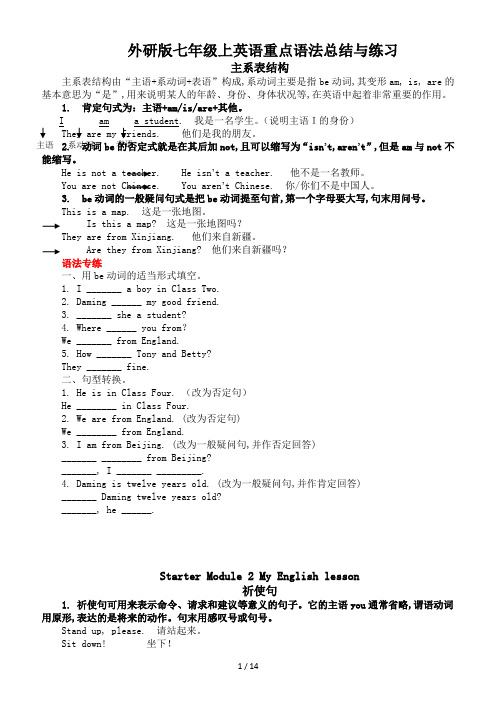
外研版七年级上英语重点语法总结与练习主系表结构主系表结构由“主语+系动词+表语”构成,系动词主要是指be动词,其变形am, is, are的基本意思为“是”,用来说明某人的年龄、身份、身体状况等,在英语中起着非常重要的作用。
1. 肯定句式为:主语+am/is/are+其他。
I am a student. 我是一名学生。
(说明主语I的身份)They are my friends. 他们是我的朋友。
主语系动词表语2. 动词be的否定式就是在其后加not,且可以缩写为“isn’t,aren’t”,但是am与not不能缩写。
He is not a teacher. He isn’t a teacher. 他不是一名教师。
You are not Chinese. You aren’t Chinese. 你/你们不是中国人。
3. be动词的一般疑问句式是把be动词提至句首,第一个字母要大写,句末用问号。
This is a map. 这是一张地图。
Is this a map? 这是一张地图吗?They are from Xinjiang. 他们来自新疆。
Are they from Xinjiang? 他们来自新疆吗?语法专练一、用be动词的适当形式填空。
1. I _______ a boy in Class Two.2. Daming ______ my good friend.3. _______ she a student?4. Where ______ you from?We _______ from England.5. How _______ Tony and Betty?They _______ fine.二、句型转换。
1. He is in Class Four. (改为否定句)He ________ in Class Four.2. We are from England. (改为否定句)We ________ from England.3. I am from Beijing. (改为一般疑问句,并作否定回答)_______ ________ from Beijing?_______, I _______ _________.4. Daming is twelve years old. (改为一般疑问句,并作肯定回答)_______ Daming twelve years old?_______, he ______.Starter Module 2 My English lesson祈使句1. 祈使句可用来表示命令、请求和建议等意义的句子。
外研版七年级英语上册全部知识点
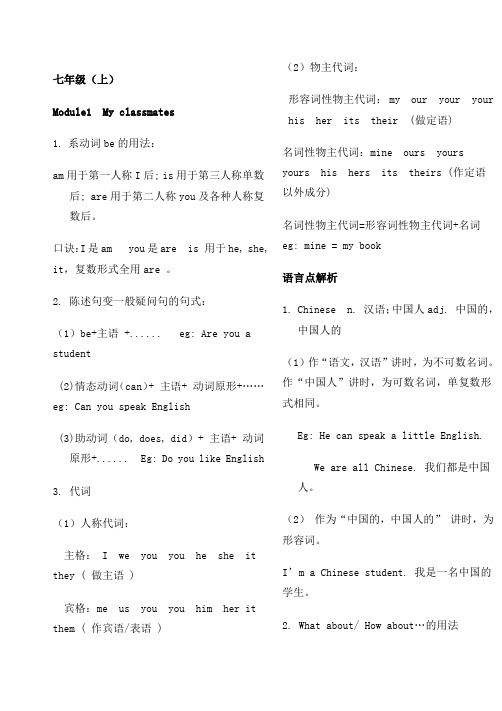
七年级(上)Module1 My classmates1.系动词be的用法:am用于第一人称I后; is用于第三人称单数后; are用于第二人称you及各种人称复数后。
口诀:I是am you是are is 用于he, she, it,复数形式全用are 。
2. 陈述句变一般疑问句的句式:(1)be+主语 +...... eg: Are you a student(2)情态动词(can)+ 主语+ 动词原形+……eg: Can you speak English(3)助动词(do, does, did)+ 主语+ 动词原形+...... Eg: Do you like English3. 代词(1)人称代词:主格: I we you you he she it they ( 做主语 )宾格:me us you you him her it them ( 作宾语/表语 )(2)物主代词:形容词性物主代词: my our your your his her its their (做定语)名词性物主代词:mine ours yours yours his hers its theirs (作定语以外成分)名词性物主代词=形容词性物主代词+名词eg: mine = my book语言点解析1.Chinese n. 汉语;中国人adj. 中国的,中国人的(1)作“语文,汉语”讲时,为不可数名词。
作“中国人”讲时,为可数名词,单复数形式相同。
Eg: He can speak a little English.We are all Chinese. 我们都是中国人。
(2)作为“中国的,中国人的”讲时,为形容词。
I’m a Chinese student. 我是一名中国的学生。
2. What about/ How about…的用法(1)What about you = How about you 用来询问对方或第三者对前面所讨论话题的看法。
外研社七年级上册英语知识点

StarterModule1My teacher and my friends【短语归纳】1.good morning早上好2.good afternoon 下午好3.thank you 谢谢你4.my teacher 我的老师5.my friend 我的朋友6.Miss Zhou周老师【用法集萃】1.I'm… = My name's… 我叫…2.Hello,class.同学们好。
3.This is… 这是…4. It's time to do sth.到做某事的时间了。
5.His/ Her name's… 他的/她的名字是…【典句必背】1.What's your name, please?请问你叫什么名字?2.Can you spell it, please? 你能拼写一下吗?3.How are you?-- Fine, thank you. 你好吗?我很好,谢谢你。
4.Nice to meet you.见到你很高兴。
5.It’s time to go now.现在到走的时间了。
6.See you tomorrow.明天见。
Module2My English lesson【短语归纳】1.sit down 坐下2.put up 举起3.stand up 起立4.a new student 一名新学生5.in Class3 在三班6.telephone number 电话号码7.how many多少【用法集萃】1.Mr.Chen's… 陈老师的…2.What's your...number? 你的…号码是什么?3.How old + be +...? …多大了?4.How many + 可数名词复数+ are there? 有多少…?【典句必背】1.Are you a new student here? 你是这里的一名新学生吗?2.What class are you in? -- I'm in Class3.Mr.Chen's class. 你在一个班里?我在三班。
外研版英语七年级上册单词表

七年级上册单词Module 1*meet [mi:t] v.认识,遇见*first adj.第一*English n.英语lesson n.(一节)课class n.班级*student n.学生Miss n.女士;小姐(对未婚女性的称呼) twelve num.十二year n.……岁thirteen num.十三*too adv.也*from prep.从……来*close v.关闭open V.打开match v.相称;匹配*write V.写practise v.练习*city n.城市*England n.英国;英格兰*English adj.英国的fourteen num.十四eleven num.十一blackboard n.黑板twenty-nine num.二十九fifty num.五十Module 2*parent n.父;母(pl.parents父母)can v.aux.能够*basketball n.篮球piano n.钢琴tennis n.网球*table tennis乒乓球*ride v.骑;开(车)horse n.马*welcome v.欢迎*international adj.国际的*factory n.工厂hotel n.饭店;宾馆university n.大学hospital n.医院office n.办公室*doctor n.医生*worker n.工人manager n.经理secretary n.秘书*at prep.在(工作或学习地点)向,朝*photo n.照片*family n.家庭*her pron.她的Module 3there pron.(用于引导句子)forty-six num.四十六*dictionary n.字典,词典*library n.图书馆*picture n.图片;照片*right adj.正确的fifteen num.十五sixteen num.十六seventeen num.十七eighteen num.十八nineteen num.十九thirty num.三十sixty num.六十seventy num.七十eighty num.八十ninety num.九十dining hall 饭厅;饭堂gym (=gymnasium). n.体育馆*science n.科学;科学课lab(=laboratory)n.实验室in front of 在……前面next prep.在……旁边behind prep.在……后面*some adj.一些*any pron.任何(一个)*one n.一个物;一个人building n.建筑物Module 4many adj.许多*people n.人们;人aunt n. 姨;伯母;婶母舅母;姑母grandfather n.祖父;外祖父grandmother n.祖母;外祖母*grandparent n.(外)祖父;(外)祖母uncle n.叔叔;伯伯;舅舅;姑父;姨夫*sister n.姐;妹*have v.有have got 拥有*grandma n.奶奶;姥姥*grandpa n.爷爷;姥爷*email n.电子邮件him pron.他(宾格)*make v.做,制造Module 5healthy adj.健康的*orange n.橘子drink n.饮料v.喝*fruit n.水果*vegetable n.蔬菜beef n.牛肉carrot n.胡萝卜*chicken n.鸡肉*juice n.果汁melon n.甜瓜*milk n.牛奶onion n.洋葱pork n.猪肉potato n.土豆*tomato n.西红柿*favourite adj.最喜欢的*noodle n.面条candy n.糖果Coke n.可口可乐*hamburger n.汉堡包*icream 冰激凌unhealthy adj.不健康的fridge (=refrigerator) n.冰箱Revision Module A*party n.晚会;聚会*birthday n.生日*last adj.刚刚过去的;最近的table n.桌子*them pron.他/她/它们(宾格)*young adj.年轻的*live v.生活;住.*chocolate n.巧克力Module 6 invitation n.邀请cinema n.电影院would v.aux.愿意*film n.电影stadium n.体育馆match n.比赛star n.明星*team n.队伍*evening n.晚上Friday n.周五Monday n.周一Saturday n.周六Sunday n.周日Thursday n.周四Tuesday n.周二Wednesday n.周三*with prep.和……一起*great adj.好极的;伟大的*idea n.想法;主意*let v.让*let's=let us 让我们……when adv.什么时候,何时invite v.邀请on adj.进行;上演ask v.询问;问magic n.魔术show n.表演day n.日子;白天*place n.地点price n.价格*theatre n.剧院*swimming n.游泳*come v.来*today adv.今天plan n.计划*playground n.操场stay v.停留*game n.游戏Module 7*talk v.谈论*about prep.关于What about…? (询问其他人的情况)……怎么样?*time n.时间*o'clock n.……点钟*half n.一半*past prep.超过……art n.美术;艺术*chemistry n.化学*history n.历史*at prep.在(某时间或时刻) *start v.开始get up 起床have v.吃*breakfast n.早饭*house n.房子;住宅*break n.(课间)休息*lunch n.午饭or conj.或者go home 回家*dinner n.晚饭;正餐*finish v.结束;完成*park n.公园*housework n.家务劳动Module 8*different adj.不同的habit n.习惯*always adv.总是;一直*card n.卡片*present n.礼物*usually adv.通常often adv.经常never adv.从不get v.得到*send v.发送*OK int. 好的(表同意)*ticket n.票pair n.双;对a pair of 一双;一对trainer n. 软运动鞋jeans n.(复)牛仔裤*T-shirt n.T恤concert n.音乐会*box n.盒子silk n.丝绸shirt n.衬衫*magazine n.杂志novel n.小说*CD (=compact disk)n.光盘choose v.选择,挑选*lot n.大量;许多lots of 大量;许多a lot of 大量;许多*clothes n.衣服(总称)*music n.音乐singer n.歌手on prep.通过,以……方式on television通过电视;在电视上its pron.它的*think v.想,认为think of 想出Moule 9.trip n.旅行zoo n.动物园*tiger n.老虎camel n.骆驼*elephant n.大象*lion n.狮子*giraffe n.长颈鹿kangaroo n.袋鼠*monkey n.猴子*panda n.熊猫*snake n.蛇wolf n.狼polar bear 北极熊guide n.导游thousand num.千*visit v.参观;访问.n.参观;访问*every adj.每一个/只*animal n.动物zebra n.斑马more adj.更多Australia n.澳大利亚Australian adj.澳大利亚的Arcti n.北极Europe n.欧洲*European adj.欧洲的*Asia n.亚洲Asian adj.亚洲的*here adv.在这里*bamboo n. 竹子Module 11.Stand up, please. 请起立。
外研社七年级上册英语 Module 7 词汇和语法基础(解析版) (1)
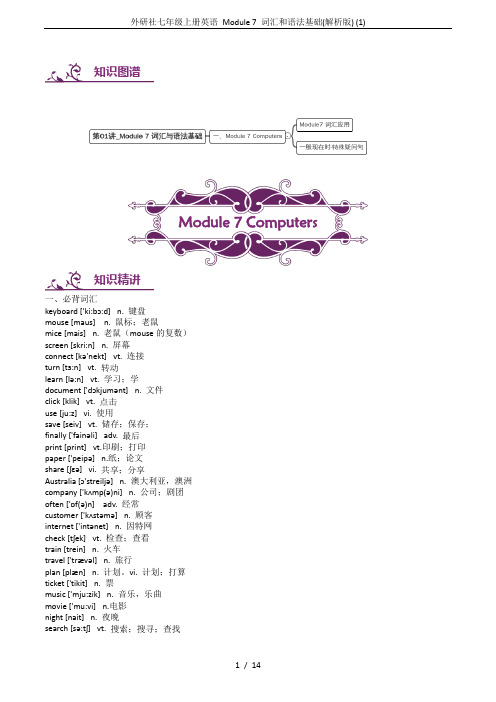
知识图谱Module 7 Computers知识精讲一、必背词汇keyboard ['ki:bɔ:d]n. 键盘mouse [maus]n. 鼠标;老鼠mice [mais]n. 老鼠(mouse的复数)screen [skri:n]n. 屏幕connect [kə'nekt]vt. 连接turn [tз:n]vt. 转动learn [lə:n]vt. 学习;学document ['dɔkjumənt]n. 文件click [klik]vt. 点击use [ju:z]vi. 使用save [seiv]vt. 储存;保存;finally ['fainəli]adv. 最后print [print]vt.印刷;打印paper ['peipə]n.纸;论文share [ʃεə]vi. 共享;分享Australia [ɔ'streiljə]n. 澳大利亚,澳洲company ['kʌmp(ə)ni]n. 公司;剧团often ['ɒf(ə)n]adv. 经常customer ['kʌstəmə]n. 顾客internet ['intənet]n. 因特网check [tʃek]vt. 检查;查看train [trein]n. 火车travel ['trævəl]n. 旅行plan [plæn]n. 计划。
vi. 计划;打算ticket ['tikit]n. 票music ['mju:zik]n. 音乐,乐曲movie ['mu:vi]n.电影night [nait]n. 夜晚search [sə:tʃ]vt. 搜索;搜寻;查找information [,infə'meiʃən]n. 信息email ['i:meil]n. 电子邮件send [send]vt. 发送game [ɡeim]n. 游戏sometimes ['sʌmtaim]adv. 有时候;不时cinema ['sinəmə]n. 电影;电影院clothes [kləuðz]n. 衣服(总称)visit ['vizit]vt. 探望;参观holiday ['hɔlədi]n. 假日;节日二、重点词汇1. connect verb /kəˈnekt/1). to join or be joined with something else(使/被)连接;(使/被)相连例句:Can I connect my printer to your computer?我能把我的打印机连在你的计算机上吗?Most villages in the highlands are now connected by roads.高原的大多村庄都通了公路。
外研版七年级上册Module-7语法练习(有答案)

外研版七年级上册Module 7语法练习一、用所给词的适当形式填空。
1.What _________(do) he usua l ly _________(do) a f t e r school2. Danny ___________(lea rn) Engl i s h f rom h is f r i ends.3. How many lessons __________ your c lassmates _________(have) on Monday4. Mike somet imes ____________(go)to school wi th h i s s i s t e r.5. How ____________ you __________(save)the document6. _________ To m__________(have)a compute r7.We __________(use)the In te rne t,but we ____________(no t p lay) games on our compute r.8. Tony __________(no t v i s i t) h i s unc le, bu t he o f ten ___________(send)emai l s.9. How ___________ Da ming ___________(go)to school every day10.What _________the g i r l _________(have)in he r box二、单项填空。
1.---_______ do I save the document---You click ‘save’, and write a t n.ame for iA.What2. ________ do you usua l ly go to the c inema --- On Sunday even ing.A. How manyB.WhenC.What t i meD.What3. ________ do you do on your compute r---I send emai l s to my f r i ends.A. HowB.WhereC.W ha tD.W henB.WhenC.WhereD. How4. _________---M y paren t s.A.What a re your paren t s C.Who wr i t es these l e t t e r sB.Where do you wri te l e t t e r sD.What do you wri t e to your pa ren t s5. ________ do you usua l ly go to school, MaryA. HowB.WhenC.Where三、按要求完成句子。
外研版英语七年级上册单元练习题Module7
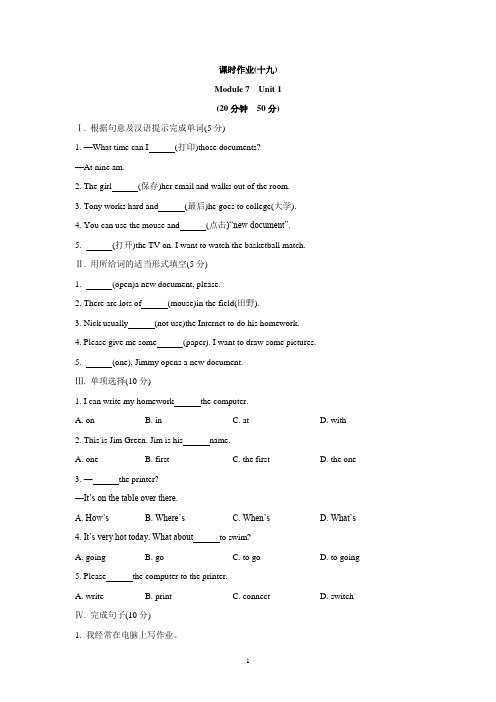
课时作业(十九)Module 7 Unit 1(20分钟50分)Ⅰ. 根据句意及汉语提示完成单词(5分)1. —What time can I(打印)those documents?—At nine am.2. The girl(保存)her email and walks out of the room.3. Tony works hard and(最后)he goes to college(大学).4. You can use the mouse and(点击)“new document”.5. (打开)the TV on. I want to watch the basketball match.Ⅱ. 用所给词的适当形式填空(5分)1. (open)a new document, please.2. There are lots of(mouse)in the field(田野).3. Nick usually(not use)the Internet to do his homework.4. Please give me some(paper). I want to draw some pictures.5. (one), Jimmy opens a new document.Ⅲ. 单项选择(10分)1. I can write my homework the computer.A. onB. inC. atD. with2. This is Jim Green. Jim is his name.A. oneB. firstC. the firstD. the one3. —the printer?—It’s on the table over there.A. How’sB. Where’sC. When’sD. What’s4. It’s very hot today. What about to swim?A. goingB. goC. to goD. to going5. Please the computer to the printer.A. writeB. printC. connectD. switch Ⅳ. 完成句子(10分)1. 我经常在电脑上写作业。
外研版-英语-七年级上-外研版英语七上Module7:能力提升综合练习
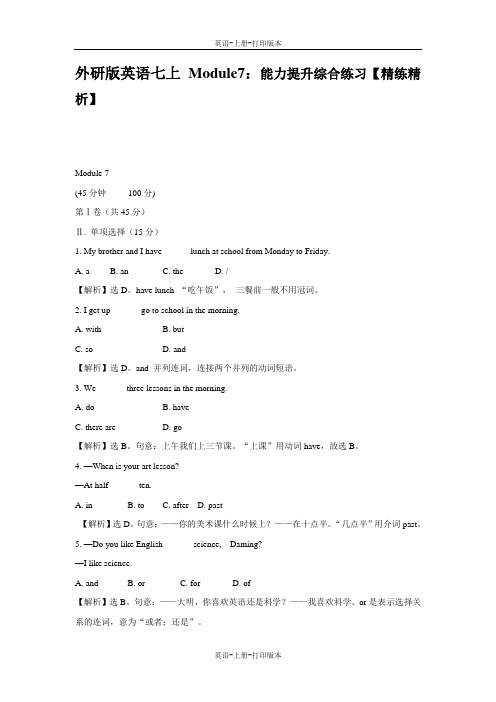
外研版英语七上Module7:能力提升综合练习【精练精析】Module 7(45分钟100分)第Ⅰ卷(共45分)Ⅱ. 单项选择(15分)1. My brother and I have______ lunch at school from Monday to Friday.A. aB. anC. theD. /【解析】选D。
have lunch “吃午饭”,三餐前一般不用冠词。
2. I get up ______ go to school in the morning.A. withB. butC. soD. and【解析】选D。
and 并列连词,连接两个并列的动词短语。
3. We ______ three lessons in the morning.A. doB. haveC. there areD. go【解析】选B。
句意:上午我们上三节课。
“上课”用动词have,故选B。
4. —When is your art lesson?—At half ______ ten.A. inB. toC. afterD. past【解析】选D。
句意:——你的美术课什么时候上?——在十点半。
“几点半”用介词past。
5. —Do you like English ______ science, Daming?—I like science.A. andB. orC. forD. of【解析】选B。
句意:——大明,你喜欢英语还是科学?——我喜欢科学。
or是表示选择关系的连词,意为“或者;还是”。
6. My mum does ______ housework every day.A. manyB. muchC. anyD. a lots of【解析】选B。
句意:我妈妈每天做很多家务活。
housework是不可数名词,不能用many 修饰;此句是肯定句式,排除C项;D项短语本身错误;much可以修饰不可数名词,故选B。
外研版初中英语七年级上册Module1~10知识点汇总
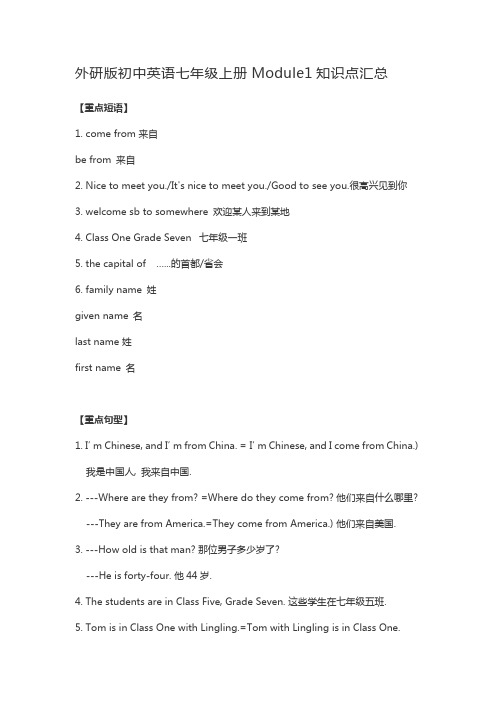
外研版初中英语七年级上册Module1知识点汇总【重点短语】1. come from 来自be from 来自2. Nice to meet you./It's nice to meet you./Good to see you.很高兴见到你3. welcome sb to somewhere 欢迎某人来到某地4. Class One Grade Seven 七年级一班5. the capital of …...的首都/省会6. family name 姓given name 名last name 姓first name 名【重点句型】1. I’m Chinese, and I’m from China. = I’m Chinese, and I come from China.) 我是中国人, 我来自中国.2. ---Where are they from? =Where do they come from? 他们来自什么哪里? ---They are from America.=They come from America.) 他们来自美国.3. ---How old is that man? 那位男子多少岁了?---He is forty-four. 他44岁.4. The students are in Class Five, Grade Seven. 这些学生在七年级五班.5. Tom is in Class One with Lingling.=Tom with Lingling is in Class One.=Tom and Lingling are in Class One. 汤姆和玲玲在一班.6. What about you?=How about you?=And you? 你呢?/你怎么样?7. Welcome to Class 6 Grade 7! 欢迎来到七年级六班。
外研版(衔接版)七年级英语上册module 7 My School Day ppt1

2. Writing skill: To write about one`s school day. Improve the students’ writing ability (难点). To learn to join simple sentences with and.
3. Affection and attitudes: We should be interested in school life and form good habits
We should be interested in school life and form good habits
What about…? (重点)
2. Listening skill: To understand conversations and to process information of time and school subjects in the listening. (难点) 3.Affection and attitudes: We should be interested in school life and form good habits. Learning strategies: Bottom –up approach and listening to the tape and do some exercises.
Affection and attitudes
We should respect the other people.
Period 5. Around the world &Module Task
Teaching Content: Around the world &Module Task
英语:Module 7《 My school day》同步练习1(外研社版七年级上)
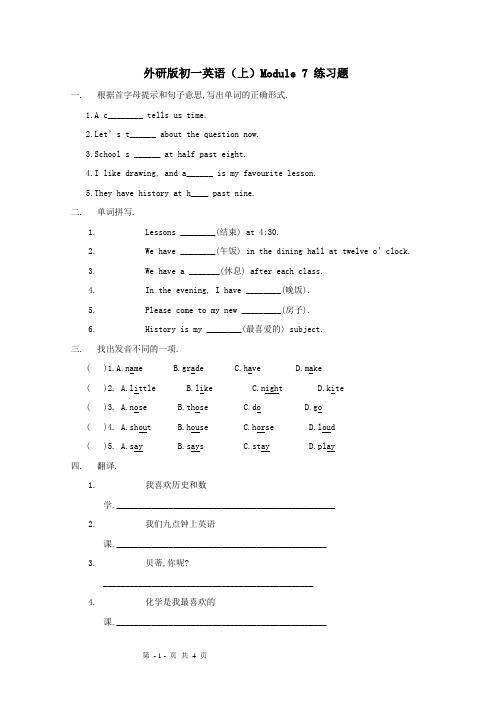
外研版初一英语(上)Module 7 练习题一. 根据首字母提示和句子意思,写出单词的正确形式.1.A c________ tells us time.2.Let’s t______ about the question now.3.School s ______ at half past eight.4.I like drawing, and a______ is my favourite lesson.5.They have history at h____ past nine.二. 单词拼写.1. Lessons ________(结束) at 4:30.2. We have ________(午饭) in the dining hall at twelve o’clock.3. We have a _______(休息) after each class.4. In the evening, I have ________(晚饭).5. Please come to my new _________(房子).6. History is my ________(最喜爱的) subject.三. 找出发音不同的一项.( ) B.grade C.have D.make( )2. A.little B.like C.night D.kite( )3. A.nose B.those C.do D.go( )4. A.shout B.house C.horse D.loud( )5. A.say B.says C.stay D.play四. 翻译.1. 我喜欢历史和数学.__________________________________________________2. 我们九点钟上英语课.________________________________________________3. 贝蒂,你呢? ________________________________________________4. 化学是我最喜欢的课.________________________________________________5. 他们的科学课是什么时间?____________________________________________6. 我周末不去上学.____________________________________________________7. 他们在学校吃早饭. ________________________________________________8. 晚上我做作业和睡觉.________________________________________________9. 我们四点半回家. _________________________________________________10. 今天是星期几? _________________________________________________11. 今天是几月几日? _________________________________________________12. 他不喜欢喝茶. _________________________________________________13. 现在几点了? _________________________________________________14. 两节课之间,我们有课间休息,并与朋友们进行交谈.Between two lessons,we ______________________________________ our friends.15. 英语词组.(1)起床 _____________________ (2)回家_____________________(3)做作业____________________ (4)去上学___________________(5)吃早饭 (6)吃午饭___________________(7)吃晚饭 (8)休息一下_________________(9)睡觉 (10)谈话 __________________(11)八点半___________________ (12)一节英语课______________(13)在十点钟_________________ (14)…怎么样?_______________(15)在化学课上_______________ (16)我最喜欢的课____________(17)谈论_____________________ (18)在两点半________________(19)在早上___________________ (20)在下午__________________五. 句型转换.1. We have science at eight o’clock.(改为否定句)_____________________________________________(划线提问) _____________________________________________2. What time is it now?(改为同义句)_____________________________________________3. How about some chicken?(改为同义句)_____________________________________________4. My favourite lesson is Chinese.(划线提问) _____________________________________________5. Her maths lesson is at three o’clock.(划线提问) _____________________________________________六. 动词的适当形式填空.1. You _____(have) lunch at school ,right?2. Lessons _______ (start)at nine o’clock on weekdays.3. We _______(not go) to school on Sunday.4. They have history in the morning, but we _______(not have).5. I can ______(play) football on the playground in the afternoon, but I_______(not like)football.6. Li Ming often _________(go) to school by bike.7. This boy ________(come) from America.8. I often ______ (get) up at six .七. 介词填空.1. We go to bed _______ the evening.2. We have an art lesson ________Wednesday.3. I have lunch _______half past eleven.4. I often talk _______ my friends after class.5. Please talk _______ your school day.6. I go swimming ____Sunday.7. They have dinner ____the dining hall.8. The students play football ____ the afternoon.9. I stay ____ home on Saturday and Sunday.10. My friend sits ____ front of me.八. 改错.1. What about go to the park? _______2. I don’t do my homework at Sunday. _______3. I get up on six o’cloc k in the morning. _______4. I have the breakfast at seven o’clock in the morning. _______5. I watch TV but play computer games in the afternoon. _______6. They have an English party in Saturday evening. _______7. His father goes to London at July. _______8. He has the lunch at school. ______9. What date is it today? ______10. When do you begin for Shanghai? ______九. 书面表达.根据表格内容写一篇短文,介绍你的一天的学习生活情况.要求:1.语言通顺,连贯,有条理.2.介绍清楚.。
外研版七年级上册Module7 知识点+习题(含答案)

第7讲Computers学习目标一、熟练掌握重点单词、词组的用法;二、熟练掌握一般现在时的特殊疑问句的用法;三、会做对划线部分提问;四、对句型变化掌握更加熟练;五、理解并运用关于电脑的介绍。
知识串烧单词1、keyboard ['ki:,bɔ:d] 键盘2、mouse [maʊs] 鼠标;老鼠3、screen [skri:n] 屏幕4、connect [kə'nekt] 连接5、turn [tɜːn] 转动6、turn on 打开7、learn [lɜːn] 学;学习8、document ['dɒkjʊmənt] 文件9、click [klɪk] 点击10、use [juːz] 使用11、save [seɪv] 保存;储存12、box [bɒks] 框;盒子13、finally ['faɪnəlɪ] 最后14、print [prɪnt] 打印15、paper ['peɪpə] 纸16、share [ʃeə] 共用、分享17、Australia [ɒs'treɪlɪə] 澳大利亚18、company ['kʌmpənɪ] 公司;剧团19、often ['ɒfən] 经常20、customer ['kʌstəmə] 顾客21、internet ['ɪntənet] 因特网22、check [tʃek] 检查、查看23、train [treɪn] 火车24、travel ['trævl] 旅行25、plan [plæn] n.计划26、v.计划;打算27、ticket ['tɪkɪt] 票28、music ['mjuːzɪk] 音乐29、movie ['muːvɪ] 电影30、night [naɪt] 夜晚31、search [sɜːtʃ] 搜寻;搜索;查找32、information [ɪnfə'meɪʃn] 信息33、email ['iːmeɪl] 电子邮件34、send [send] 发送35、game [geɪm] 游戏36、sometimes ['sʌmtaɪmz] 有时候;不时37、cinema ['sɪnɪmə] 电影院38、clothes [kləʊðz] 衣服(总称)39、visit ['vɪzɪt] 探望;参观40、holiday ['hɒlɪdeɪ] 假日;节日课文U1 How do I write my homework on the computer? Linging: How do I write my homework on the computer? Can I learn?Betty: Sure! First, open a new document. Click the mouse on "new document". Linging: What's the mouse? Is this it?Betty: Yes.Linging: Where do I click on "new document"?Betty: On the left of the screen... there!Linging: OK, what's next?Betty: Next, you write your homework in the new document. Use the keyboard.Linging: What do I do next? How do I save the document?Betty: You click "save", and write a name for it.Linging: Where do I write the name?Betty: Write it in the box. OK, then click "save" again.Linging: OK. Finally, how do I print my document?Betty: Click "print" and "OK".Linging: What about some paper?Betty: Oh yes, of course! You put the paper in there first!U2 When do you use a computer?There is a computer in my home, and my father and I shares it. My father is a manager of a company, so he often talks to his customers on the computer. He also goes on the Internet to check the times of trains, make travel plans, and buy tickets. I listen to music or watch movies on it every Friday night. – JackThere is no computer in my home. I can only use it at school. On the Internet, I search for information, do my homework and check my email. I have a friend in Australia.I can see her and talk to her on the Internet. – AliceWe have a computer at home. My parents don't use it. I can use it on Sundays. I send email to my friends and play computer games. But sometimes I play a lot of games and my mother doesn't like it. -- Mike语法一、一般现在时的特殊疑问句A.定义:以特殊疑问词开头,对句中某一成分提问的句子叫特殊疑问句。
外研版英语7年级上册单元测试题(Modules 7)

Module 7(45分钟100分)第Ⅰ卷(共40分)Ⅰ. 听力(10分)(Ⅰ)录音中有五个句子, 听一遍后, 选择最佳答语。
(5分)1. A. No, I don’t. B. Thank you.C. Yes, I have.2. A. Two. B. Yes, he does.C. In Class Two.3. A. No, I can’t. B. Yes, I do.C. Yes, please.4. A. She sees animals.B. She never goes to the zoo.C. At six o’clock.5. A. He goes to school.B. He does his homework.C. He plays Seer.(Ⅱ)录音中有一篇短文, 听两遍后, 选择最佳答案。
(5分)6. Ted is in now.A. EnglandB. ChinaC. America7. Can Ted often see his parents?A. Yes, he can.B. No, he can’t.C. I don’t know.8. Ted often to his parents.A. writesB. sends emailsC. gives telephone calls9. Does Ted chat(聊天)with his parents?.A. Yes, he doesB. No, he doesn’tC. We don’t knowA. basketballB. table tennisC. footballⅡ. 单项选择(10分)1. Lingling, have dinner and then do your homework.A. firstB. nextC. thenD. finally2. —Can you connect the mouse the computer?—Yes, I can.A. onB. inC. forD. to3. You can use the to click “save” to save the document.A. screenB. printerC. keyboardD. mouse4. (2012·西宁中考)—do you have a class meeting?—Once a week.A. How oldB. How farC. How oftenD. How long5. I want to use the computer. Can you?A. turn on itB. turn it onC. turn it offD. turn off it6. My father computer games at home.A. sometimes playB. plays sometimesC. sometime playsD. sometimes plays7. (2012·黔西南州中考)Sally works very hard. Finally, she won the first place. 可代替画线部分的是:A. At the end ofB. At lastC. LuckilyD. To the end8. Jill and Bill their homework in the afternoon.A. doesn’tB. doesn’t doC. don’tD. don’t do9. —Tony often online?A. Does; goB. Do; goC. Does; goesD. Do; goes10. We can use a computer to search some information on the Internet.A. ofB. atC. fromD. forⅢ. 完形填空(10分)Lin Tao has a computer. He likes1very much. He often2the Internet.He downloads(下载)music from the Internet. He often visits websites(网站)to get3for4homework. He also5emails to his good friends. He makes manygood friends from all6the world with the help of his computer. He likestravelling very much, so he often7travel plans on the computer. 8hedoesn’t download games9the Internet, because he10like computer games at all.1. A. him B. it C. its D. them2. A. makes B. visits C. checks D. uses3. A. information B. questions C. answers D. books4. A. his B. her C. he D. she5. A. sends B. send C. buy D. buys6. A. for B. over C. in D. on7. A. takes B. makes C. buys D. has8. A. And B. Or C. But D. So9. A. in B. from C. to D. at10. A. don’t B. can’t C. doesn’t D. isn’tⅣ. 阅读理解(10分)Jessica is a 25-year-old woman. She works in a company. She is a busywoman. Like many young people, the computer is the most(最) important part inJessica’s daily life. She spends a lot of time in front of a computer every day. Inthe morning, she reads news on the computer for one hour and then she works forthree hours. In the afternoon, she works on the computer for about four hours.When she goes home in the evening, she still sits in front of her computer. Sheplays games or talks with her friends on the Internet. Sometimes she buys things, such as books,1. How old is Jessica?A. She is twenty.B. She is twenty-two.C. She is twenty-four.D. She is twenty-five.2. Where does Jessica work?A. In a company.B. In a school.C. In a hotel.D. In a hospital.3. How long does Jessica work a day?A. About three hours.B. About four hours.C. About five hours.D. About seven hours.4. What does Jessica usually do on the computer in the evening?A. She reads news.B. She works.C. She listens to music.D. She plays games.5. Which of the following is TRUE?A. Jessica is not happy with her daily life.B. The computer is important for Jessica.C. Jessica enjoys working in her company.D. Jessica often uses the computer to print documents.第Ⅱ卷(共60分)Ⅴ. 用所给词的适当形式填空(10分)1. I want(send)emails to my friends.2. Henry(not visit)his grandparents on Sundays.3. Do you like(listen)to music?4. Danny(search)for some information for his homework.5. My uncle often(check)the timetable on the Internet.Ⅵ. 完成句子(10分)1. 你经常上网吗?you often______ ______ the Internet?2. 我在网上与朋友交谈, 但是我不玩游戏。
外研版七年级上册英语M5 My school day Unit 3 Language in use

考点2 表示主语的特征、性格或能力等。 eg:Welovesports.我们喜欢运动。
典例 他们说英语。 _T_h_e_y_s_p_e_a_k_E_n_g_l_i_sh_._______________________
classes______C__.(福州)
A.interested
B.interest
C.interesting
【点拨】此题用分析比较法。句意:——我们都喜欢王老 师。——我同意你的观点。她总是使她的英语课有趣。 interested修饰人,interesting则修饰物。故选C。
知识点 3 finish/'fInIʃ/v.完成;结束;用尽
Languagepractice WehaveChineseateighto'clock. Wedon'thavemaths. Doyoulikemaths? Yes,Ido. Intheevening,IwatchTVandhavedinnerwithmyfamily.
语法讲解
行为动词的一般现在时 (1)
ModuleM5 yschoolday
Unit3 Languageinuse
同学们,上一课学习的单词你们都掌握了吗?现在大家 来检验一下,点击下面的音频开始听写吧!
根据汉语,完成句子。 1.我们在八点钟上语文课。 ___W__e_h_a_v_e___Chineseateighto’colck. 2.我们不上数学课。
(3)____________
,
havebreakfast havelunch startwo and (4)__________ateight.
外研版英语七年级上册Module7 实义动词一般现在时态的特殊疑问句
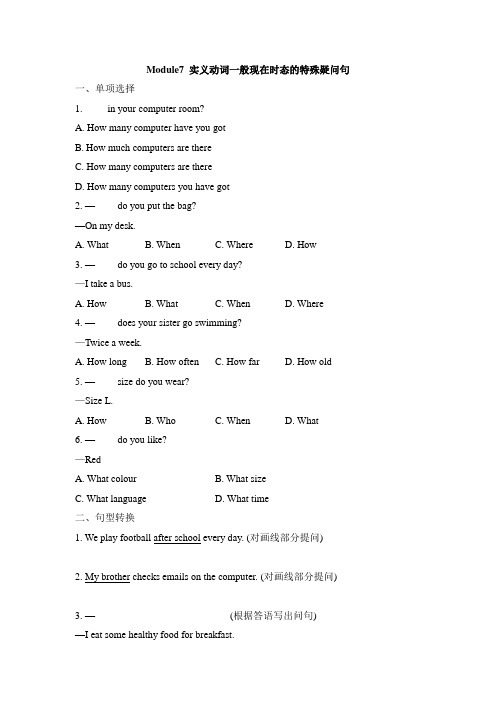
5.D由答语可知,问句问的是尺码,故答案为D。
6.A由答语可知,问句问的是“你喜欢什么颜色?”,故答案为A。
二、
1. When do you play football every day?
2. Who checks emails on the computer?
___________________________________________
2.My brotherchecks emails on the computer.(对画线部分提问)
___________________________________________
3. —___________________________(根据答语写出问句)
Module7实义动词一般现在时态的特殊疑问句
一、单项选择
1. ____ in your computer room?
A. How many computer have you got
B.How muchcomputers are there
C.How many computersare there
D.How many computersyou have got
2. —____ do you put the bag?
—On my desk.
A. WhatB. WhenC. WhereD. How
3. —____do you go to school every day?
—Itake a bus.
3. What do you eat for breakfast?
4. How many emails do they send every day?
步步为“赢”英语外研版七上Module7Unit3综合测试

Module 7 My school day一、汉译英1.在六点半________ 2.九点钟________3.休息________ 4.做家庭作业________5.去上学________ 6.吃晚饭________7.上历史课________ 8.上床睡觉________9.回家________ 10.做家务________二、非常3+l 排除干扰。
选出正确答案1.What about to the cinema?A.go B.to go C.going D.goes 2.They usually have lunch at 11:30at school.A.a B.an C.the D./3.—________is it today?一It’s Friday.A.What B.When C.What day D.Which 4.We ________science today.A.not have B.have not C.don’t have D.not 5.1watch TV________seven________the evening.A.at;on B.in ;in C.on;at D.at;in 6.We go ________home at half past three.A.to B.at C./D.in 7.He has a nice house________a big garden.A.to B.of C.with D.but 8.We have a break talk ________our friends.A.and;in B.but; of C.and;to D.but;to 9.Maths________my favourite lesson.A.be B.is C.am D.are 10.We________an English lesson on Tuesday.A.have B.has C.do D.are 三、句子大变脸根据要求改写句子1.Today is Sunday.(就画线部分提问)—________ ________ is it________ today?—________ ________.2.I do my homework at 8 o’clock.(改为否定句)I________ ________ my homework at 8 o’clock.3.What about going boating?(改为同义句)________ ________ go boating.4.Betty’s science lesson is at half past six.(就画线部分提问)________ ________ Betty’s science lesson?5.I get up at seven thirty.(改为同义句)I get up at ________ ________ seven.四、英汉同期声根据汉语意思完成句子1.“今天星期几”“星期三。
外研版-英语-七上-Module7 My school dayUnit 2
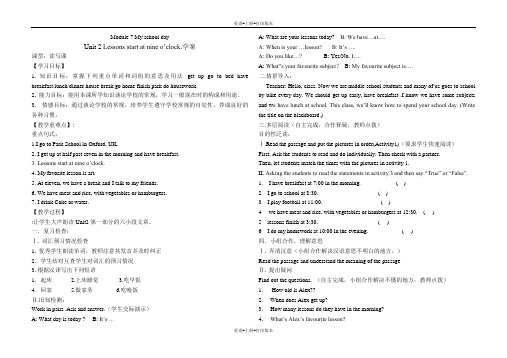
Module 7 My school dayUnit 2 Lessons start at nine o’clock.学案课型:读写课【学习目标】1. 知识目标:掌握下列重点单词和词组的意思及用法get up go to bed have breakfast/lunch/dinner house break go home finish park do housework2. 能力目标:能用本课所学知识谈论学校的常规,学习一般现在时的构成和用途。
3. 情感目标:通过谈论学校的常规,培养学生遵守学校常规的自觉性,养成良好的各种习惯。
【教学重难点】:重点句式:1.I go to Park School in Oxford, UK.2. I get up at half past seven in the morning and have breakfast.3. Lessons start at nine o’clock.4. My favorite lesson is art.5. At eleven, we have a break and I talk to my friends.6. We have meat and rice, with vegetables or hamburgers.7. I drink Coke or water.【教学过程】:让学生大声朗读Unit2第一部分的六小段文章。
一.复习检查:Ⅰ. 词汇预习情况检查1. 优秀学生朗读单词,教师注意其发音并及时纠正2. 学生结对互查学生对词汇的预习情况3. 根据汉译写出下列短语1.起床 2.上床睡觉 3.吃早饭4.回家 5.做家务 6.吃晚饭Ⅱ.旧知检测:Work in pairs .Ask and answer.(学生交际演示)A: What day is today ? B: It’s …A: What are your lessons today? B: We have…at….A: When is your …lesson?B: It’s ….A: Do you like…?B: Yes/No, I….A: What”s your favourite subject?B: My favourite subject is….二.情景导入:Teacher: Hello, class. Now we are middle school students and many of us goes to school by bike every day. We should get up early, have breakfast .I know we have some subjects and w e have lunch at school. This class, we’ll know how to spend your school day. (Write the title on the blackboard.)三.多层阅读(自主完成,合作释疑,教师点拨)目的性泛读:Ⅰ.Read the passage and put the pictures in order(Activity1)(要求学生快速阅读)First, Ask the students to read and do individually. Then check with a partner.Then, let students match the times with the pictures in activity 1.II. Asking the students to read the statements in activity 3 and then say “True” or “False”.1. I have breakfast at 7:00 in the morning. ( )2 I go to school at 8:30. ( )3 I play football at 11:00. ( )4 we have meat and rice, with vegetables or hamburgers at 12:30. ( )5 lessons finish at 3:30. ( )6 I do my homework at 10:00 in the evening. ( )四.小组合作,理解意思Ⅰ. 弄清汉意(小组合作解决汉语意思不明白的地方。
- 1、下载文档前请自行甄别文档内容的完整性,平台不提供额外的编辑、内容补充、找答案等附加服务。
- 2、"仅部分预览"的文档,不可在线预览部分如存在完整性等问题,可反馈申请退款(可完整预览的文档不适用该条件!)。
- 3、如文档侵犯您的权益,请联系客服反馈,我们会尽快为您处理(人工客服工作时间:9:00-18:30)。
Module 6---Module 7 复习学案一、知识点梳理1.单词Module 6.idea---a good idea--a great idea ---an idea, team---in the basketball team---play for… team invite –invites—invite sb to do sth. –invite sb. to + 地点---invitation---an invitation to the cinema, star---a film star, cinema—go to the cinema, match—matches--- go to a football match, morning, afternoon, Monday ---Sunday playground --- on the playground today---today’s newspaper—tonight, would – would like---would like to do sth.—would like sb. to do sth, stadium--- at Dalian Stadium. ask---ask sb. to do sth. price ---the price of … theatre --- at the theatre. Swimming – go to a swimming lesson, stay --- stay at home.weekend---on weekends --- at the weekendModule 7:about – talk about --what about … time –what time … half – half past twelve. Art – an art lesson –art lessons. ---like art chemistry/history/maths—have chemistry/history/maths ---have a chemistry/history/maths lesson—have chemistry /history/maths lessons. start—lessons start…-- School s tarts … (反义:finish,用法基本一致) break –have a break--- It’s time for break. = It’s time to have a break.Have breakfast/lunch/dinner. Housework—do housework.2.句型:1. would you like 用法:1、后加to do2. 一般疑问句提前would 人称随之变化(该变则变),其他不变。
3、同义词:want would you like = do you want 其他不变。
2. let’s 用法:1、后加动词原形2、同义句why don't you …3、Thank you for 后加动词的ing 形式或加名词。
4、ask sb to do sth5、invite sb to do sth.6. What about +ving.二.短语提取:1.一次去电影院的邀请.2. 邀请某人去看某事.3. 在下午/上午/晚上4. 和贝蒂和我一起去看电影.5. 我最喜爱的电影明星.6. 看一部成龙主演的电影7. 在花园酒店8. 最美好的祝愿.9.看望奶奶. 10. 观看足球赛.11. 在澳大利亚的野餐. 12. 我的学校日13. 八点半. 14. 紧挨着我的家.15. 上三节课. 16. 在餐厅.17. 放学18. 课间休息.\三.重要句子翻译:1. 你愿意跟我一起去看电影吗?2. 那是个好主意.让我们和玲玲一起去吧.3. 大明邀请托尼去看电影.4. 电影是在上午上映.5. <<狮子王>>什么时候演? 是在下午和晚上.6. 今天你上什么课?7. 我们今天不上科学课.8. 大明和玲玲在八点半上一节语文课.9.我八点半去上学,九点开始上课.10. 我们吃加蔬菜肉和米饭, 或者汉堡.四.练习题:I单词题一)1. There will be two basketball ______________(match).2. Let’s _________(play) basketball on the playground.3. Would you like ____________(go) to the park on Sunday?4. Tom _______(do) his homework every day.5. We have four ____________(class) in the morning.6. The students are on the p ________________(操场).7. Let’s watch a football m _____________ on Saturday.8. Would you like to see a film ______________(今晚)?9. This is t___________ newspaper. Here you are.10. Australians often have a picnic on w ____________.11. That’s a good i____________________.12. Thanks for your i______________________, but I have a test tomorrow.13. Yao Ming is a basketball s ___________.14. Would you like to go the c ____________ to see a film?15. Peter i______________ me to see a film.16. My father often watches football m __________ on TV.17. Which t____________ are you playing for now?18. Does Daming i_____________ you to his birthday party?19. Thanks for your i______________.20. Let’s s ___________ at home today.21. What about ____________(see ) a film?22. Thank you for ______________(invite) me.二). 根据汉意完成句子(B)1.She likes a_______________, she can learn drawing from it.2.S_____________ is interesting but hard to learn.3.We have c________________ at the laboratory.4.I study E___________ hard because I want to talk with Americans.5.What time is it? It’s h_____________ past six.6.I have many l________________ at school, and I study hard.7.My father is a guide, what a______________ your father?8.It’s twelve ________________.Let’s have lunch.9.A year s_______________ in spring.10.I know many famous people in h______________ class.II、句型题:根据要求完成下列各题:(B)1.It’s six thirty.(划线提问)________________________2.They go home at 5:25. (划线提问)_________________________________3.History is my favorite lesson.(同义句)I _______history ______.4.I like walking, and you?I like walking, _____ _ ______you?5.It’s Friday tomorrow.. (划线提问)______ _____ is it tomorrow?6.the, don’t, we, have, in, morning, chemistry(连词成句)________________________________________7the, don’t, we, have, have, in, morning, chemistry(连词成句)___________________________________________8.Betty can sing good.(改错)__________9.When do you usually go to the bed? (改错)__________10.We play games in Sunday. (改错)__________11. I’d like to go to the cinema. (改为一般疑问句).______ you _____ _________go to the cinema?12. The film is at Beijing Cinema.(对划线部分提问).__________ is the film?13. Would you like to go with me?(做肯定回答)Yes, _____ _______ _______.14. The film is on in the evening. ( 对划线部分提问)________ _______ the film __________?15. We have a picnic on Saturday. (用let’s改为祈使句)________ _________ a picnic on Saturday.16. Why don’t we go swimming tomorrow?(改为祈使句______ ______ swimming tomorrow.17. We have a football match in the afternoon.(对划线部分提问)_____ ______ ________ _______a football match?18. Would you like a glass of milk?(用let 改写句子)_______ _______ a glass of milk.III.完成对话(B)A: Oh, but I usually get up at seven.B: That’s go od!C: Do you have lunch at home?D: What time do you get up on weekdays?E: It’s time to have our English class!A: Hi, Peter! You are early today.B: Yes. I come to school early every day.A:__1__At seven o’clock?B: No, that’s too late. I get up at 6:30.A:__2__I live near my school. I can have lunch at home.__3__B: No, I usually have lunch at school. After lunch I often play games with my friends.A:__4__What about Wu Yue?B:I think she has lunch at home. Her home is not far from here.A: Oh, Miss Gao is coming.__5__B: Let’s go in!五.看看你掌握的情况:A、一周七天的表达:B、各种科目的表达:C、有关时间:什么时候/晚上/日子,白天/晚上/今天/时间/……点钟/一半/超过/在(某时)D、有关一日活动:起床/吃早饭/课间休息/午饭/回家/吃晚餐/结束,完成/做家务劳动E、有关地点:电影院/体育馆/地点/剧院/操场/房子/公园F、其他动词:邀请/愿意/让/询问/来/停留/谈论/开始G、名词:邀请/电影/比赛/明星/想法/队伍/魔术/表演/价格/游泳/计划/游戏H、介词:和……一起/关于/六.综合要求:能熟练地说出以上词汇,能掌握他们的音标,能说出与之相关的短语,能根据以上词汇说出短句,能写出一篇小文章。
